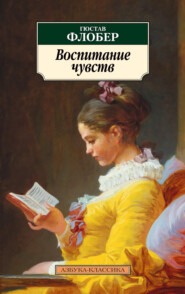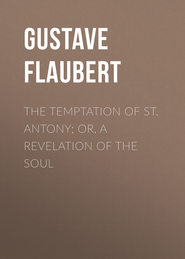По всем вопросам обращайтесь на: info@litportal.ru
(©) 2003-2024.
✖
Sentimental Education; Or, The History of a Young Man. Volume 2
Настройки чтения
Размер шрифта
Высота строк
Поля
"Why, no! I assure you! upon my word of honour!"
These feeble denials ended by convincing Deslauriers. He congratulated his friend, and asked him for some details. Frederick gave him none, and even resisted a secret yearning to concoct a few. As for the mortgage, he told the other to do nothing about it, but to wait. Deslauriers thought he was wrong on this point, and remonstrated with him in rather a churlish fashion.
He was, besides, more gloomy, malignant, and irascible than ever. In a year, if fortune did not change, he would embark for America or blow out his brains. Indeed, he appeared to be in such a rage against everything, and so uncompromising in his radicalism, that Frederick could not keep from saying to him:
"Here you are going on in the same way as Sénécal!"
Deslauriers, at this remark, informed him that that individual to whom he alluded had been discharged from Sainte-Pelagie, the magisterial investigation having failed to supply sufficient evidence, no doubt, to justify his being sent for trial.
Dussardier was so much overjoyed at the release of Sénécal, that he wanted to invite his friends to come and take punch with him, and begged of Frederick to be one of the party, giving the latter, at the same time, to understand that he would be found in the company of Hussonnet, who had proved himself a very good friend to Sénécal.
In fact, the Flambard had just become associated with a business establishment whose prospectus contained the following references: "Vineyard Agency. Office of Publicity. Debt Recovery and Intelligence Office, etc." But the Bohemian was afraid that his connection with trade might be prejudicial to his literary reputation, and he had accordingly taken the mathematician to keep the accounts. Although the situation was a poor one, Sénécal would but for it have died of starvation. Not wishing to mortify the worthy shopman, Frederick accepted his invitation.
Dussardier, three days beforehand, had himself waxed the red floor of his garret, beaten the armchair, and knocked off the dust from the chimney-piece, on which might be seen under a globe an alabaster timepiece between a stalactite and a cocoanut. As his two chandeliers and his chamber candlestick were not sufficient, he had borrowed two more candlesticks from the doorkeeper; and these five lights shone on the top of the chest of drawers, which was covered with three napkins in order that it might be fit to have placed on it in such a way as to look attractive some macaroons, biscuits, a fancy cake, and a dozen bottles of beer. At the opposite side, close to the wall, which was hung with yellow paper, there was a little mahogany bookcase containing the Fables of Lachambeaudie, the Mysteries of Paris, and Norvins' Napoléon– and, in the middle of the alcove, the face of Béranger was smiling in a rosewood frame.
The guests (in addition to Deslauriers and Sénécal) were an apothecary who had just been admitted, but who had not enough capital to start in business for himself, a young man of his own house, a town-traveller in wines, an architect, and a gentleman employed in an insurance office. Regimbart had not been able to come. Regret was expressed at his absence.
They welcomed Frederick with a great display of sympathy, as they all knew through Dussardier what he had said at M. Dambreuse's house. Sénécal contented himself with putting out his hand in a dignified manner.
He remained standing near the chimney-piece. The others seated, with their pipes in their mouths, listened to him, while he held forth on universal suffrage, from which he predicted as a result the triumph of Democracy and the practical application of the principles of the Gospel. However, the hour was at hand. The banquets of the party of reform were becoming more numerous in the provinces. Piedmont, Naples, Tuscany —
"'Tis true," said Deslauriers, interrupting him abruptly. "This cannot last longer!"
And he began to draw a picture of the situation. We had sacrificed Holland to obtain from England the recognition of Louis Philippe; and this precious English alliance was lost, owing to the Spanish marriages. In Switzerland, M. Guizot, in tow with the Austrian, maintained the treaties of 1815. Prussia, with her Zollverein, was preparing embarrassments for us. The Eastern question was still pending.
"The fact that the Grand Duke Constantine sends presents to M. d'Aumale is no reason for placing confidence in Russia. As for home affairs, never have so many blunders, such stupidity, been witnessed. The Government no longer even keeps up its majority. Everywhere, indeed, according to the well-known expression, it is naught! naught! naught! And in the teeth of such public scandals," continued the advocate, with his arms akimbo, "they declare themselves satisfied!"
The allusion to a notorious vote called forth applause. Dussardier uncorked a bottle of beer; the froth splashed on the curtains. He did not mind it. He filled the pipes, cut the cake, offered each of them a slice of it, and several times went downstairs to see whether the punch was coming up; and ere long they lashed themselves up into a state of excitement, as they all felt equally exasperated against Power. Their rage was of a violent character for no other reason save that they hated injustice, and they mixed up with legitimate grievances the most idiotic complaints.
The apothecary groaned over the pitiable condition of our fleet. The insurance agent could not tolerate Marshal Soult's two sentinels. Deslauriers denounced the Jesuits, who had just installed themselves publicly at Lille. Sénécal execrated M. Cousin much more for eclecticism, by teaching that certitude can be deduced from reason, developed selfishness and destroyed solidarity. The traveller in wines, knowing very little about these matters, remarked in a very loud tone that he had forgotten many infamies:
"The royal carriage on the Northern line must have cost eighty thousand francs. Who'll pay the amount?"
"Aye, who'll pay the amount?" repeated the clerk, as angrily as if this amount had been drawn out of his own pocket.
Then followed recriminations against the lynxes of the Bourse and the corruption of officials. According to Sénécal they ought to go higher up, and lay the blame, first of all, on the princes who had revived the morals of the Regency period.
"Have you not lately seen the Duc de Montpensier's friends coming back from Vincennes, no doubt in a state of intoxication, and disturbing with their songs the workmen of the Faubourg Saint-Antoine?"
"There was even a cry of 'Down with the thieves!'" said the apothecary. "I was there, and I joined in the cry!"
"So much the better! The people are at last waking up since the Teste-Cubières case."[D] (#litres_trial_promo)
"For my part, that case caused me some pain," said Dussardier, "because it imputed dishonour to an old soldier!"
"Do you know," Sénécal went on, "what they have discovered at the Duchesse de Praslin's house – ?"
But here the door was sent flying open with a kick. Hussonnet entered.
"Hail, messeigneurs," said he, as he seated himself on the bed.
No allusion was made to his article, which he was sorry, however, for having written, as the Maréchale had sharply reprimanded him on account of it.
He had just seen at the Théâtre de Dumas the Chevalier de Maison-Rouge, and declared that it seemed to him a stupid play.
Such a criticism surprised the democrats, as this drama, by its tendency, or rather by its scenery, flattered their passions. They protested. Sénécal, in order to bring this discussion to a close, asked whether the play served the cause of Democracy.
"Yes, perhaps; but it is written in a style – "
"Well, then, 'tis a good play. What is style? 'Tis the idea!"
And, without allowing Frederick to say a word:
"Now, I was pointing out that in the Praslin case – "
Hussonnet interrupted him:
"Ha! here's another worn-out trick! I'm disgusted at it!"
"And others as well as you," returned Deslauriers.
"It has only got five papers taken. Listen while I read this paragraph."
And drawing his note-book out of his pocket, he read:
"'We have, since the establishment of the best of republics, been subjected to twelve hundred and twenty-nine press prosecutions, from which the results to the writers have been imprisonment extending over a period of three thousand one hundred and forty-one years, and the light sum of seven million one hundred and ten thousand five hundred francs by way of fine.' That's charming, eh?"
They all sneered bitterly.
Frederick, incensed against the others, broke in:
"The Democratie Pacifique has had proceedings taken against it on account of its feuilleton, a novel entitled The Woman's Share."
"Come! that's good," said Hussonnet. "Suppose they prevented us from having our share of the women!"
"But what is it that's not prohibited?" exclaimed Deslauriers. "To smoke in the Luxembourg is prohibited; to sing the Hymn to Pius IX. is prohibited!"
"And the typographers' banquet has been interdicted," a voice cried, with a thick articulation.
It was that of an architect, who had sat concealed in the shade of the alcove, and who had remained silent up to that moment. He added that, the week before, a man named Rouget had been convicted of offering insults to the king.
"That gurnet[E] (#litres_trial_promo) is fried," said Hussonnet.
This joke appeared so improper to Sénécal, that he reproached Hussonnet for defending the Juggler of the Hôtel de Ville, the friend of the traitor Dumouriez.
"I? quite the contrary!"
He considered Louis Philippe commonplace, one of the National Guard types of men, all that savoured most of the provision-shop and the cotton night-cap! And laying his hand on his heart, the Bohemian gave utterance to the rhetorical phrases:

















